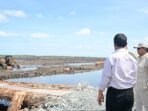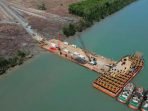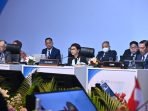Badung, Bali – The Fifth World Reconstruction Conference (WRC5), which is being held from May 23–24 in Bali, is focusing on crisis recovery and resilience in a world transformed by COVID-19.
The conference is being conducted in conjunction with the 7th session of the Global Platform for Disaster Risk Reduction, themed “Reconstructing for a sustainable future: Building resilience through recovery in a COVID-19 Transformed World.”
“Post-disaster recovery is an opportunity to reset the development pathway toward a greener and more resilient future,” UN Assistant Secretary General and Director of UNDP’s Crisis Bureau Asako Okai said at the conference here on Monday.
The impacts of the pandemic have been compounded by other natural disasters, conflicts, and crises, she noted.
Disasters such as the COVID-19 pandemic undermine development gains and set back efforts to achieve the sustainable development goals (SDGs), she added.
Therefore, the WRC5 aims to provide a global platform where policy makers, experts, practitioners from governments, international organizations, non-governmental organizations (NGOs), academia, and the private sector can come together to share experiences regarding disaster recovery and reconstruction and take the policy dialog forward.
Traditionally, the WRC has been organized by three partners—the European Union, United Nations Development Programme (UNDP), and World Bank—in conjunction with the Global Platform for Disaster Risk Reduction (GPDRR). This year, the International Recovery Platform has joined as a partner.
In the two years since the COVID-19 pandemic began, the world has changed profoundly, as have the opportunities for social, infrastructural, and economic recovery.
Okai said that WRC5 will address the unprecedented socioeconomic recovery needs to determine the pathway to rebuilding a resilient and sustainable society in the post-COVID-19 world.
The ongoing conference has three sub-themes. The first is addressing the social and economic effects and the impact of the COVID-19 pandemic on “hard-won” development gains.
The second theme is social, infrastructural, and economic recovery from disasters as an opportunity to reset the development pathway toward a greener and resilient future.
The third theme is rethinking recovery governance models: planning, financing, and managing recovery from complex and interconnected disaster-conflict events in the post-COVID-19 world.
A greener, more resilient, and inclusive approach to recovery will help repair the structural damage caused by COVID-19 and accelerate climate change mitigation and adaptation efforts while restoring the momentum on poverty reduction and shared prosperity, Okai said.
Anang Fadhilah/ant











